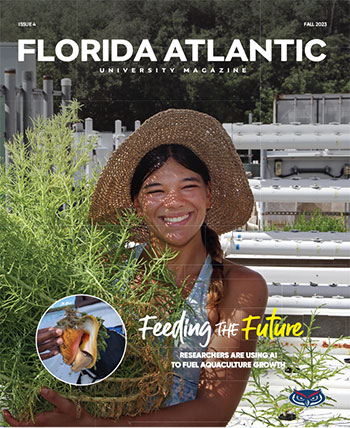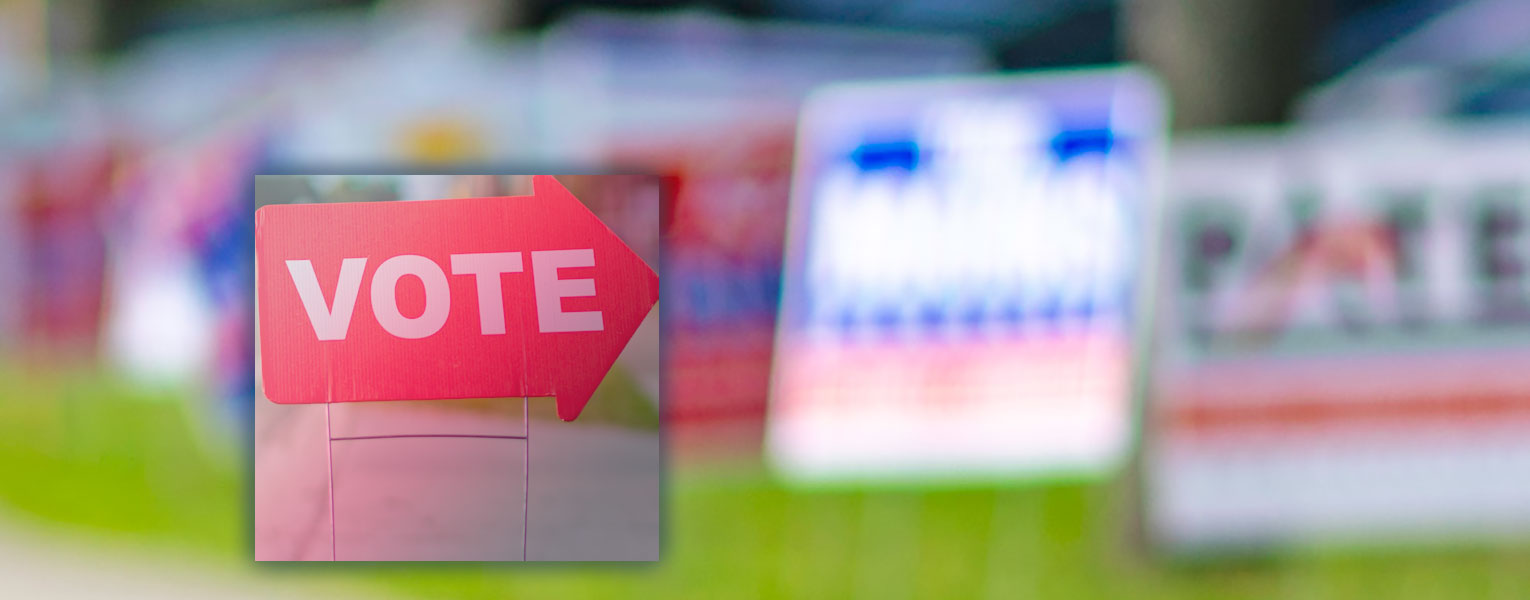1/9/2024
Florida Atlantic: Poll Position
Florida Atlantic Polling Initiatives Educate and Inform
By Joshua Glanzer, Amber Bonefont and Gisele Galoustian
Perception is reality, and where people get their news molds perceptions on various issues. Florida is the third most populous state in the nation, so knowing the views of Florida voters and their news media habits is key to understanding how the state’s sizeable political and economic influence will shape the nation’s future. Many in politics and business are watching closely because the state’s electoral college prize is often brought up during tight national elections — and the next one in 2024 may be extremely close.
Knowing the voters’ minds requires deliberate and detailed work because the current environment of self-segmented traditional and social media often creates perceptions of reality that are vastly different among co-workers, neighbors and even family members. To understand the subtleties of the public’s perceptions on various issues, Florida Atlantic has three ongoing public polling efforts — in three different colleges — that study crucial topics including economics, politics, environmental issues and Florida voters’ media habits.
A pioneer in polling at Florida Atlantic since 2014, the Business and Economic Polling Initiative (BEPI) in the College of Business has done a range of work, from analyzing Hispanic and Florida consumer attitudes to collaborating with other institutions in Florida.
Led by Monica Escaleras, Ph.D., director of FAU BEPI, the initiative currently releases two types of polls: a general topics poll looking at various opinions within the community on political, social and cultural topics; and the Hispanic Index of Consumer Sentiment, which focuses on Hispanics’ outlook on the economy and their personal finances.
“Hispanics are the largest ethnic minority group in the United States, and there is a large concentration in the state of Florida,” said Escaleras of the poll’s emphasis on the Hispanic community. “It makes a lot of sense to understand their outlook on various topics, especially the economy.”
The FAU BEPI polls have touched on a broad range of concerns important to the community over the years, like how Hispanics viewed the economy and their finances heading into 2023, how inflation impacted summer plans, and how Floridians reacted to their concerns about the economy.
BEPI is also a learning lab for students, giving them the chance to gain hands-on experience with questionnaire design, data collection and data analysis to learn every aspect of public opinion research.
“Students can engage in undergraduate research. They are learning how to write questions, how to collect that data and then turn around and analyze it,” Escaleras said.
BEPI’s work has garnered local and national media attention. It has been featured in theAssociated Press,CNN, theMiami Herald, theSouth Florida Sun Sentinel,Politico and Bloomberg. Results of a poll also were presented at the U.S. Senate.
Additionally, the initiative collaborates with other entities in the state of Florida, such as the Brevard Indian River Lagoon Coalition and the Clean Water Coalition of Indian River County. It also collaborated with other colleges at FAU, including the Charles E. Schmidt College of Medicine and the Dorothy F. Schmidt College of Arts and Letters, to collect data for research projects that have gone on to be featured in top journal publications.
Since the state’s environment strongly affects Florida’s prosperity, FAU BEPI worked with the Charles E. Schmidt College of Science to understand how the state’s environmental challenges affect voter opinions. Warm temperatures and abundant rainfall strengthen the state’s tourism, agriculture and other industries, but weather patterns also present Floridians with risks, such as flooding and high winds from hurricanes and other weather events. Over the past few years, residents have started to understand that the state will be on the front lines of the battle against the effects of climate change. The views on preparedness and resilience to climate hazards impact residents’ behavior, so understanding this is vital to emergency planners, government officials and businesses in Florida.
To investigate this, Florida Atlantic’s Center for Environmental Studies (CES) within the College of Science first partnered with BEPI in October 2019 to conduct a quarterly Florida Climate Resilience Survey. Since then, polling has continued to gauge changes in participants’ attitudes and opinions over time.
The latest survey in May showed an increasing number of Floridians agree that human actions are causing climate change, including a record number of Florida Republicans. This finding reinforces the trend observed in the seven prior Florida Climate Resilience Surveys conducted by the center.
Virtually all respondents (90 percent) believe climate change is happening, with 65 percent attributing the causes to human actions, including 49 percent of GOP voters. This belief in — and concern about — human-caused climate change appears to be translating into support for policies to reduce impacts. For example, 52 percent of Floridians support a hypothetical $10 monthly tax to strengthen Florida’s infrastructure to weather hazards. Younger Democrats and Republicans are leading this trend, with 64 percent of voters under age 35 in support.
“The longitudinal examination of Floridians’ attitudes about climate shows a consensus forming where Republicans in our state buck the national trend of their party,” said Colin Polsky, Ph.D., professor and director of the CES. “At least in Florida, climate change may no longer be an effective wedge campaign issue for elections and beyond.”
The effects of climate change and other issues drive which candidates Florida’s voters support, and Florida Atlantic is examining this as well. In April, the first poll by Florida Atlantic’s Mainstreet Research Political Communication and Public Opinion Research Lab (FAU PolCom Lab) went into the field. The lab, created by the Department of Political Science and the School of Communication and Multimedia Studies in the Dorothy F. Schmidt College of Arts and Letters, in partnership with Canadian firm Mainstreet Research, investigates the relationship between media consumption and voter behavior by combining voter opinion polling with questions about the media consumption habits of the participants.
The June/July poll by FAU PolCom Lab found that although Florida Gov. Ron DeSantis and former U.S. President Donald Trump enjoy significant popularity among Floridians, Trump maintains a formidable 20 percent lead over DeSantis among statewide GOP primary voters, with Trump capturing the support of 50 percent of Republican voters compared to DeSantis’ 30 percent. However, the poll also unveiled a promising trend for DeSantis. The gap between Trump and DeSantis in Florida narrowed by 7 percent since the PolCom Lab’s April poll results, indicating the potential for the race to tighten as the election gets closer.
“The poll highlights Donald Trump’s quite durable support. He does especially well with white working-class voters, who have consistently formed a steadfast base for the former president,” said Kevin Wagner, Ph.D., PolCom Lab co-founder and professor of political science at FAU. “This persistent support continues to bolster Trump’s strong and steady position within the party.”
For a nuanced understanding of the Floridian electorate’s relationship to news media, the most recent poll also examined voters’ media preferences, trust levels, social media usage and political news discussions. It found that GOP and Democratic voters differ on where they go for their political news. Cable news emerged as the primary choice for Republicans, with 44 percent indicating viewership, followed by Democrats (32 percent) and Independents (21 percent). Conversely, Democrats and Independents demonstrated a greater reliance on network TV news and newspapers, with 27 percent and 18 percent, respectively, compared to only 10 percent of Republicans.
Persisting skepticism toward mainstream media becomes apparent from the poll results, with a meager 10 percent of Florida voters professing unwavering trust, while 26 percent express a somewhat trusting sentiment. Gender and political affiliation exhibit noteworthy trends in this regard, as a substantial 45 percent of male voters manifest deep-rooted distrust, whereas only 20 percent of women share this sentiment. Among the political affiliations, Democrats appear more trusting, with 56 percent expressing faith in mainstream media, compared to 32 percent of Independents and 20 percent of Republicans.
However, the poll unveils a silver lining for local media with a solid 59 percent of Florida voters placing their trust in local media outlets. Further analysis reveals a slight gender discrepancy, with women (64 percent) displaying marginally higher levels of trust compared to men (55 percent).
“It is great to see that local media is still seen as influential and important to voters,” said Robert Gutsche Jr., Ph.D., associate professor in the School of Communication and Multimedia Studies. “The challenge is that local news increasingly is seeing its ranks and resources cut, which will further influence how and where voters get their information.”
Florida voters are also keen to discuss politics: 43 percent of respondents engage in political conversations occasionally, and 29 percent indicate extensive involvement in political dialogue.
Although Florida voters are discussing politics, they are not necessarily expanding their views in those talks, according to Carol Bishop Mills, Ph.D., PolCom Lab co-founder and professor of communication. Many of these conversations (56 percent) took place with individuals who sometimes agreed and sometimes disagreed, while 25 percent occurred with like-minded individuals. Surprisingly, conversations with individuals holding opposing views occurred only 10 percent of the time.
“Listening and communicating with others who hold different beliefs are valuable skills,” Mills said. “Having difficult conversations and expanding our perspectives help us avoid merely confirming our own worldview.”
If you would like more information, please contact us at dorcommunications@fau.edu.

